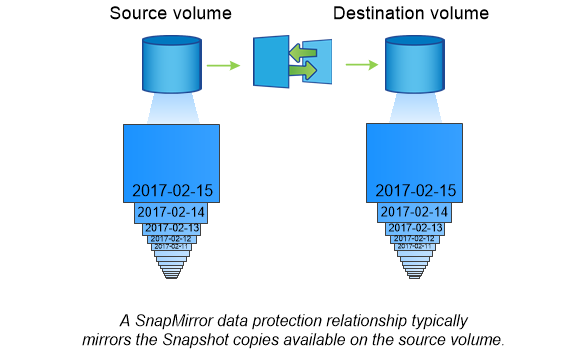Asynchronous SnapMirror disaster recovery basics
SnapMirror is disaster recovery technology, designed for failover from primary storage to secondary storage at a geographically remote site. As its name implies, SnapMirror creates a replica, or mirror, of your working data in secondary storage from which you can continue to serve data in the event of a catastrophe at the primary site.
If the primary site is still available to serve data, you can simply transfer any needed data back to it, and not serve clients from the mirror at all. As the failover use case implies, the controllers on the secondary system should be equivalent or nearly equivalent to the controllers on the primary system to serve data efficiently from mirrored storage.
Data protection relationships
Data is mirrored at the volume level. The relationship between the source volume in primary storage and the destination volume in secondary storage is called a data protection relationship. The clusters in which the volumes reside and the SVMs that serve data from the volumes must be peered. A peer relationship enables clusters and SVMs to exchange data securely.
Cluster and SVM peering express configuration
The figure below illustrates SnapMirror data protection relationships.

Scope of data protection relationships
You can create a data protection relationship directly between volumes or between the SVMs that own the volumes. In an SVM data protection relationship, all or part of the SVM configuration, from NFS exports and SMB shares to RBAC, is replicated, as well as the data in the volumes that the SVM owns.
You can also use SnapMirror for two special data protection applications:
A load-sharing mirror copy of the SVM root volume ensures that data remains accessible in the event of a node outage or failover.
A data protection relationship between SnapLock volumes lets you replicate WORM files to secondary storage.
How SnapMirror data protection relationships are initialized
The first time you invoke SnapMirror, it performs a baseline transfer from the source volume to the destination volume. The SnapMirror policy for the relationship defines the contents of the baseline and any updates.
A baseline transfer under the default SnapMirror policy MirrorAllSnapshots involves the following steps:
Make a Snapshot copy of the source volume.
Transfer the Snapshot copy and all the data blocks it references to the destination volume.
Transfer the remaining, less recent Snapshot copies on the source volume to the destination volume for use in case the
active
mirror is corrupted.
How SnapMirror data protection relationships are updated
Updates are asynchronous, following the schedule you configure. Retention mirrors the Snapshot policy on the source.
At each update under the MirrorAllSnapshots policy, SnapMirror creates a Snapshot copy of the source volume and transfers that Snapshot copy and any Snapshot copies that have been made since the last update. In the following output from the snapmirror policy show command for the MirrorAllSnapshots policy, note the following:
- Create Snapshot is
true
, indicating that MirrorAllSnapshots creates a Snapshot copy when SnapMirror updates the relationship. - MirrorAllSnapshots has rules
sm_created
andall_source_snapshots
, indicating that both the Snapshot copy created by SnapMirror and any Snapshot copies that have been made since the last update are transferred when SnapMirror updates the relationship.
cluster_dst::> snapmirror policy show -policy MirrorAllSnapshots -instance
Vserver: vs0
SnapMirror Policy Name: MirrorAllSnapshots
SnapMirror Policy Type: async-mirror
Policy Owner: cluster-admin
Tries Limit: 8
Transfer Priority: normal
Ignore accesstime Enabled: false
Transfer Restartability: always
Network Compression Enabled: false
Create Snapshot: true
Comment: Asynchronous SnapMirror policy for mirroring all snapshots
and the latest active file system.
Total Number of Rules: 2
Total Keep: 2
Rules: SnapMirror Label Keep Preserve Warn Schedule Prefix
---------------- ---- -------- ---- -------- ------
sm_created 1 false 0 - -
all_source_snapshots 1 false 0 - -
MirrorLatest policy
The preconfigured MirrorLatest policy works exactly the same way as MirrorAllSnapshots, except that only the Snapshot copy created by SnapMirror is transferred at initialization and update.
Rules: SnapMirror Label Keep Preserve Warn Schedule Prefix
---------------- ---- -------- ---- -------- ------
sm_created 1 false 0 - -